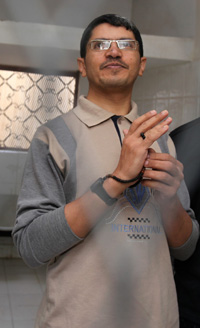New York, January 19, 2011–The Committee to Protect Journalists condemns the sentencing on Tuesday of prominent Yemeni journalist Abdulelah Hider Shaea on charges of aiding Al-Qaeda. Shaea, at left, who developed expertise on Islamist groups including Al-Qaeda during his career, was given five years in prison. In conjunction with numerous journalists and rights activists in Yemen, CPJ calls on President Ali Abdullah Saleh to pardon Shaea and release him without delay.
The court also ruled that after his release Shaea would be banned from leaving the capital, Sana’a, for two years. Numerous Yemeni legal experts have challenged the constitutionality of the Specialized Criminal Court in Sana’a, which sentenced Shaea. A 2010 CPJ special report on Yemen details how both that court and the Specialized Press Court were both specially created by Saleh’s administration to silence critical voices.
Shaea is refusing to appeal. Journalists who were in the courtroom told CPJ that after hearing the verdict he said, “I do not stand now in front of a judiciary but in front of a gang belonging to the national security apparatus.”
“We call for the immediate release of Abdulelah Hider Shaea,” said Mohamed Abdel Dayem, CPJ’s Middle East and North Africa program coordinator. “Shaea’s initial incommunicado detention and his subsequent trial were plagued by dozens of procedural violations. We call on President Saleh to use his constitutional prerogative to intervene and pardon Shaea.”
Rashad Ali al-Sherabi, a Yemeni journalist who is a regular contributor to the news website Marebpress, told CPJ that he believes Shaea’s comments about civilian casualties killed in air attacks targeting Al-Qaeda members may have angered authorities. “It is a big story that the government does not want to have told,” al-Sherabi said. Shaea has criticized the government’s policies on fighting armed Islamists groups as ineffectual. CPJ’s research indicates that his detention was likely in retaliation for his critical comments frequently made on the Al-Jazeera network.
Abdel Rahman Barman, who headed Shaea’s defense team before it resigned to protest the journalist’s unfair detention and trial, said the team is trying to convince Shaea to appeal the verdict “despite the fact that we don’t believe in the legality of this special court that convicted him.”
Shaea, who has frequently appeared on Al-Jazeera as a commentator, was detained on August 16, 2010, when a group of soldiers stormed his family house in Sana’a. His notes and computer were confiscated.
